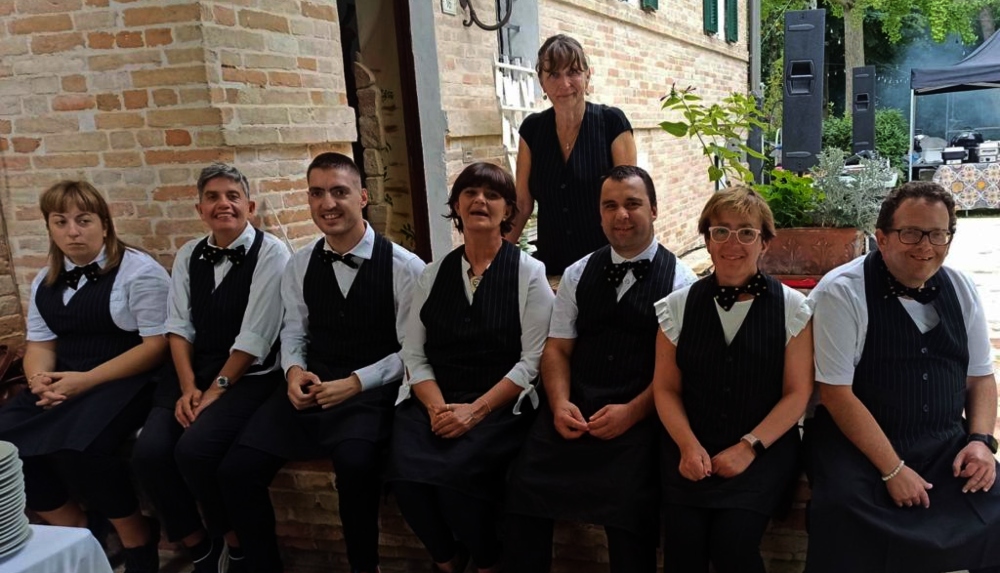For a couple of pleasant hours, I sat at a table outside the beautiful masonry house that anchors the Fattoria Sociale di Montepacini, an extraordinary rural experiment in social conscience in the Marche region of east-central Italy. I listened to Marco Marchetti, its ebullient director, explain the farm and its mission. “We want to change people who are dependent to being people who are independent,” he said, summarizing his organization’s objective. “We want to replace the idea of being cared for with the idea of caring about.”
Clearly, this is not a typical farm. It’s a fascinating form of social support that combines several cultural attributes. Above all is the thoughtful consideration of people who have challenges in life, whether physical, mental, or behavioral disabilities. Families with members who are challenged and at risk of long-term dependency can come to this farm as interns and be supported as well as learn a useful vocation.
Some interns learn how to grow vegetables, caring for gardens and fields that produce edible crops. Each week, people in the province order boxes of harvested items and then come to pay for and take the produce home. The sales of these products, along with a fully functioning restaurant, provide an income stream that supports the program. Other interns tend animals on the farm. Still others learn to become chefs. And others learn to be skilled waiters — a proud profession in Italy that some people stay with for a lifetime.
The City of Fermo, capital of the province of the same name, provided 13 hectares (32 acres) of land to the farm as a part of its responsibility to its citizens. People and companies also make annual donations. Supporters of the farm frequently meet over meals to share in their common interest in supporting members of the community who are less fortunate.
Before one of these sociable dinners, I met several of the interns. They are happy to be part of a nurturing community. Several live on the farm as full-time residents; others go to their family homes each night after they finish their work.
On this particular evening, a baker from another community was invited to give a presentation of his craft. He explained in detail the ingredients and processes with which he produces various artisanal breads. The tables were provided with baskets of his tasty breads. As he spoke, the passion for his craft was palpable. Beside him, his wife sat smiling with their small child; she would occasionally amplify a point that her husband made.
I had visited this farm once before and had a lovely lunch with two friends. That time we dined outside under a copse of trees. The servers were affable, efficient, and obviously well-trained. The director praised several for their exceptional achievements. Few things are sweeter in Italy that sitting outside and enjoying a well-prepared meal that comes from the fields you can see from your seat.
I had assumed that this was an unusual if not unique operation, that we were fortunate to have such a farm close by. I quickly learned that my assumption was wrong. Italy has hundreds of — perhaps even a thousand — such farms, all part of a fast-growing movement known as “social farming.” Starting in the 2010s, the number of such farms has grown exponentially, and they are now found throughout the country.
All of them provide learning opportunities for people with disabilities — in whatever form they may take. They equip them with life-building skills, enabling them to eventually live independently. The social farms build competence in an area of meaningful work as well as the people’s confidence in themselves. One can see how the interns enjoy what they are doing; they thrive as part of society, with the same sense of pride in their efforts as anyone else.

Recognized formally by law in 2015, social farming in Italy embodies four purposes. Serving people with disabilities and who are disadvantaged, including youth. Developing personal skills useful for daily living through a community effort. Improving the emotional and cognitive functions of individuals through engagement in agriculture. And encouraging environmental education and biodiversity.
In a real sense, such efforts pay off in the larger society by keeping challenged people from falling into homelessness and despair. It teaches people that the best support system is themselves. This is possibly an avenue that people in the United States could explore when they point to mental illness as the source of social problems. Address the conditions before they explode into a national crisis.
It’s also a way of strengthening community by demonstrating how volunteers can make a real difference. Marchetti himself serves as director without pay. He has poignantly expressed how personally fulfilling this role has been for him. He spent years working in public administration but eventually felt burdened by the weight of politics. His current role lets him experience, face to face, the benefits of his work on the faces and in the minds of people in need.
Marco displays a passionate faith in the young people who are acquiring new skills, learning how to participate in the community — and in the important role of agriculture in communities. Through their experiences the participants can feel not disabled but fully able to contribute.
Social farming nurtures human relationships. By instilling self-sufficiency and respect for people with varied abilities, it is making an impressive difference in Italy.
